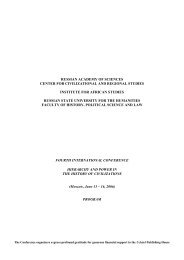L. Fituni, I. Abramova Resource Potential of Africa and Russia's ...
L. Fituni, I. Abramova Resource Potential of Africa and Russia's ...
L. Fituni, I. Abramova Resource Potential of Africa and Russia's ...
Create successful ePaper yourself
Turn your PDF publications into a flip-book with our unique Google optimized e-Paper software.
number <strong>of</strong> other <strong>Africa</strong>n states that were interested in it, for example,<br />
with Nigeria, Morocco, Tunisia <strong>and</strong> Libya.<br />
Closer to the demise <strong>of</strong> the Soviet Union, new trends have<br />
emerged in the development <strong>of</strong> the USSR's economic cooperation<br />
with <strong>Africa</strong>n countries. For one, stable economic ties were taking<br />
shape with several <strong>Africa</strong>n countries planned for even longer than<br />
usual periods, which enhanced trade <strong>and</strong> the efficiency <strong>of</strong> production<br />
at macroeconomic levels – something in which both the USSR<br />
<strong>and</strong> <strong>Africa</strong>n states were interested. Such an approach allowed<br />
overcoming the shortcomings <strong>of</strong> ‘single-project efficiency” approach.<br />
Sometimes the <strong>Africa</strong>n partner would sacrifice a possibility<br />
to receive immediate pr<strong>of</strong>its from a completed project in order<br />
to guarantee a stable inflow <strong>of</strong> revenues on a later stage from a<br />
broader complex project or to provide stable permanent employment<br />
for large masses <strong>of</strong> population. Such an approach was mutually<br />
beneficial. So called compensation deals allowed <strong>Africa</strong>n<br />
countries to acquire industrial enterprises, which produced required<br />
goods <strong>and</strong> had an opportunity <strong>of</strong> guaranteed sales <strong>of</strong> part <strong>of</strong><br />
their goods to the USSR thus ensuring timely repayment <strong>of</strong> Soviet<br />
credits. In turn, the USSR received goods it needed for its national<br />
economy (see pp.100–101).<br />
Cooperation with the USSR in some cases introduced the young<br />
states to the latest achievements in science <strong>and</strong> technology. Soviet<br />
organizations in general supplied them with the most up-to-date (at<br />
least by Soviet st<strong>and</strong>ards) machinery <strong>and</strong> equipment, technologies,<br />
licenses <strong>and</strong> other technical documents, while Soviet specialists<br />
shared their expertise with them. It was universally recognized that<br />
the overwhelming majority <strong>of</strong> the Soviet engineers, technicians,<br />
doctors <strong>and</strong> teachers working in <strong>Africa</strong>n, just as in all other, developing<br />
countries, not only conscientiously fulfilled all terms <strong>of</strong> their<br />
contracts, but also shared their knowledge <strong>and</strong> experience with all<br />
local citizens working next to them. Thanks to the cooperation with<br />
the USSR the developing countries <strong>of</strong> <strong>Africa</strong> consolidated their economic<br />
<strong>and</strong> political positions, create foundations <strong>of</strong> modern industries<br />
<strong>and</strong> reduced their dependence on the imported goods <strong>and</strong> world<br />
markets.<br />
144







